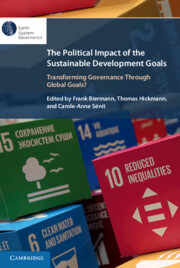“This is a critical assessment of the political change required to deliver the universally agreed UN Sustainable Development Goals. I strongly advise everyone in political office to read this book. We are already two years into the decisive decade for humanity’s future on Earth, when we need to reach the safe and just landing zone defined by the SDGs. This agenda integrates people and planet, and requires transformative thinking and doing. Also in politics.”
“This is a much needed book published at the mid-point to achieve the SDGs. We have been waiting for a book like this – an evidence-based and holistic assessment of the progress towards the SDGs from a global governance perspective. All stakeholders should learn from the authors on how we can achieve the SDGs.”
“Knowing whether and how universal goal setting as exemplified by the UN’s SDGs is or isn’t creating transformative change towards global sustainability is important right now. An assessment of the question in 2030 will be interesting but too late. This study poses a timely and profound challenge to scholars and practitioners of global governance to identify what else, if anything, can and must be done in the time we have left to move societies towards positive action in securing the future we all agree we want.”
“This comprehensive and rigorous assessment is essential reading for anyone seeking to ensure that the Decade of Action means something more than words. Agreeing on the SDGs was a major achievement of the international community in 2015 and the significance of this common vision only grows in turbulent times. To make the goals and principles have a real steering effect on the decisions societies make, it is now imperative to learn from the shortcomings identified in this study and find new ways to accelerate action. I hope this assessment sparks new ideas and new determination.”
“Biermann, Hickmann and Sénit have led an extraordinary effort to take stock of all that we know and don't know about the impact of the SDGs to date, this is a unique resource for researchers, practitioners and policy makers. It is particularly valuable coming at mid-point in implementation, with enough time left for course correction.”

